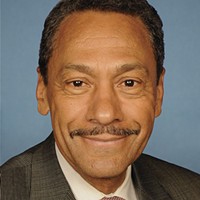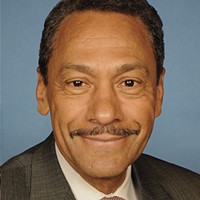After much discussion, the 12th District's congressional seat - left vacant by longtime statesman Mel Watt, the new head of the Federal Housing Finance Agency - will be up for grabs in November after Gov. Pat McCrory decided to to schedule the special election to fill the seat to coincide with the regular election. His decision would leave the district without representation for almost a year, a controversial decision, to say the least. Politics writer Mike Cooper and long-time columnist and former editor-in-chief John Grooms couldn't agree with each other about McCrory's decision, so we asked them to duke it out in that most gentlemanly way - with their words.
McCrory made the right decision in 12th District
By Michael A. Cooper

There are several reasons to give the governor of North Carolina shit right now. The Department of Health and Human Services mailed 49,000 Medicaid cards to the wrong address; he's "obsessed with his image"; and his press office can't take a joke.
But there is a difference between objectively critiquing embarrassing mistakes and the sort of partisan needling that lacks sincerity - and an unbiased eye.
That happened this week in response to Pat McCrory's decision over the vacancy in North Carolina's 12th Congressional District. On Jan. 6, the 12th's very own Congressman Mel Watt was sworn in as the head of the Federal Housing Agency, which required that he vacate his congressional seat. The vacancy required a special election scheduled by the governor and a regular election to fill it permanently. Given the stakes of the race, and the interest of groups like Emily's List and other liberal organizations, any decision McCrory made would draw criticism.
There were two options. McCrory could have scheduled the special election primary in early spring. With six candidates, there would have been a runoff in late spring and a final "special" general election over the summer. Instead, McCrory scheduled the special election to coincide with the regular election for the seat, with the primary on May 6, the probable runoff in July, and the final election (both special and regular) in November.
The Charlotte Observer was right to point that this was "the best, imperfect" decision that was possible. Had McCrory scheduled the special and regular elections separately, the result would have been confusion, increased costs and a coronation instead of a real campaign.
Watt represented the 12th for 21 years, longer than FDR was president. There are eligible voters in the district who weren't alive before Watt was a congressman. The idea that he can be replaced in three or four months without allowing time for the voters to decide who they want is an insult to the district and to Watt's legacy.
It's no secret that the favorites in the race are state Sen. Malcolm Graham from Charlotte and state Rep. Alma Adams from Greensboro. With their name recognition and familiarity on the ballot, each would have coasted into a runoff. That might happen anyway, but voters deserve a chance to get to know state Rep. Marcus Brandon and attorneys George Battle and Curtis Osborne, who are also running. This is a democracy, where elections are more than lifetime-achievement awards.
But immediately after McCrory's decision, Democrats, including Congressmen David Price and G.K. Butterfield, were criticizing him for creating a vacancy in the seat that will last till November. Yes, that is a long time to go without a voting member of Congress for much of the cities of Charlotte, Winston-Salem, Greensboro and High Point - the only Democratic district between Burlington, N.C., and Nashville. But this is also the first special congressional election in North Carolina history. There is no precedent.
Complaining about the symbolism of not having a congressperson makes Democrats sound like Tea Partiers, who often don't understand the complexities of the country.
Watt's staff will remain in place to handle constituent services. We'll lose Watt's seniority and influence on committees, including the powerful House Financial Services Committee, but the new representative has to start over anyway. It's also one vote in the House of Representatives, a "do-nothing" Congress, and the least popular institution in the country.
It's doubtful there will be meaningful votes in the House where a liberal Democrat will be a deciding factor and highly unlikely any will take place between July and November, the additional vacancy that is supposedly McCrory's fault.
But that didn't stop the criticism. The normally insightful Gary Pearce called it "McCrory's Bridge," a comparison to Gov. Chris Christie's "Bridgegate" in New Jersey, implying that McCrory chose to spite Charlotte voters.
But there is no scandal. Period.
McCrory's decision will save more than $1 million by combining the election cycles - the very fiscal responsibility that North Carolinians elected a Republican governor for in the first place. It respects voters by giving them time to make an informed decision. And it was the right thing to do.
McCrory made many mistakes during his first year. The declining of Medicaid expansion and the cutting off of unemployment benefits are particularly unforgivable. But if Democrats complain about every single thing the governor does, it will keep them from having the moral authority to cry out (and be heard) when McCrory does something truly harmful - a guarantee in this administration.
###
Citizens' right to representation trumps McCrory's "efficiency"
By John Grooms

Gov. McCrory's decision to not hold special elections to replace U.S. Rep. Mel Watt in the state's 12th congressional district sounds sensible. It's also dead wrong.
McCrory declared that voters in the 12th District, which is a majority-African-American district, will need to wait until the regularly scheduled elections to choose a new representative, rather than holding special elections as is usually done. This would result in the citizens of the 12th District being unrepresented in the U.S. House for nearly a year; that is intolerable, or should be, in any democracy, much less the country that fancies itself the worldwide model for that form of government.
The reasons for nixing a special election include the $1 million-plus cost and a variety of logistical difficulties that could result from a tighter-than-usual election schedule between now and November.
It's well and good to frame the 12th District election in terms of economics and efficiency, but McCrory and his supporters, including the editorial board of the Observer, are overlooking a deeper concern that overrides all talk of logistics - the right of citizens to be represented in Congress, as required by the U.S. Constitution. If 12th District citizens' right to be represented turns out to be inconvenient for the state's elections mechanism, that's just too bad. The state exists, at least partly, to guarantee citizens' rights at all times, not just when it suits a bunch of bureaucrats stuck in their comfortable rut. Just to be sure I'm being clear, here's my argument, simplified so even McCrory & Co. can understand it: Citizens' right to be represented in Congress trumps any bureaucratic exigencies or excuses about cost. Period. Some things are more important than being "businesslike" or "practical."
It's true that, at first, McCrory's reasons sound efficient and tidy, which would make his decision a no-brainer if he were running a business operation. But he's not. He's managing the most basic events in a democracy - elections. And it's not up to some functionary like McCrory to decide that the usual course of holding special elections isn't "efficient" enough.
Consider this, too: What if the 12th District wasn't a predominantly black district? And what if, say, the Raleigh and Chapel Hill areas were told they would be denied a U.S. House representative for a year because ensuring their right to representation was too costly or inconvenient? You would never hear the end of the shit storm that would erupt. So why is it OK to tell the 12th that their rights aren't worth some inconvenience to the state?


